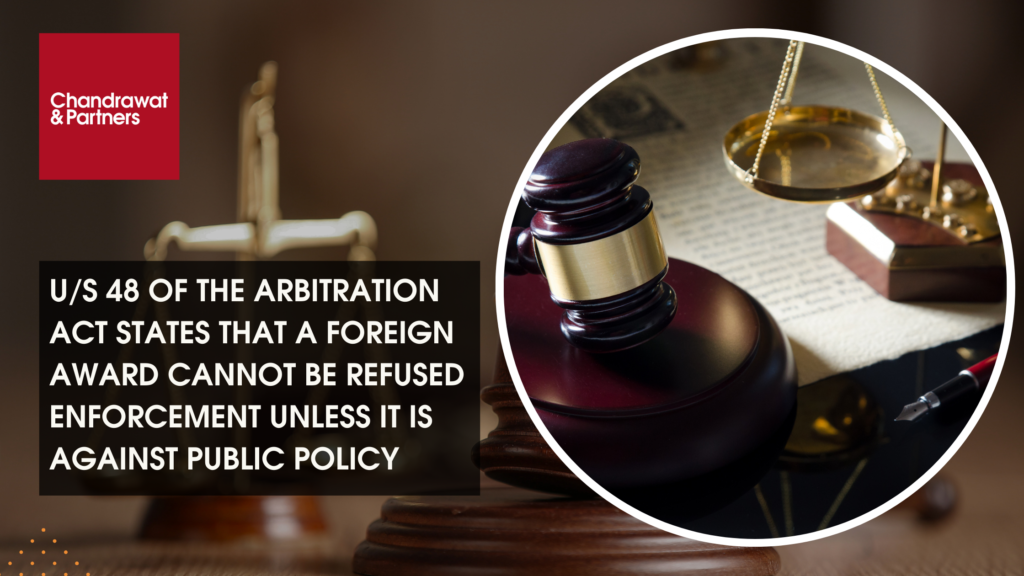Home > Recent Judgements > U/S 48 Of The Arbitration Act States That A Foreign Award Cannot Be Refused Enforcement Unless It Is Against Public Policy
Nov 18, 2024

BACKGROUND
In the case between Bulk Trading S.A. Having versus Mahendra Sponge and Power Ltd, the case is about two foreign arbitral awards and their enforcement in Canada which arose from a coal sale contract obligating the respondent to sell 50,000 MT of coal. To fulfil its contractual obligations, the Respondent was required to meet a cut-off for opening a letter of credit (“LC”) by March 31,2020, but the respondent failed to do so and the applicant terminated the contract. The arbitral tribunal was formed and both the merit award, August 11, 2021, and cost award dated March 27, 2023, were granted in favour of the applicant. These awards were challenged when the respondent attributed the failure of the LC, which was the requirement for the awarding of the letters of the loan facility, to the effect of the Corona Virus pandemic and all the related notifications. On the other hand, applicants argued that the banks were not under any lockdown due to the pandemic, so the banks offered essential services during the pandemic, and the respondents presented no evidence that caused the pandemic. The Indian Telangana High Court examined how Section 48 of the Arbitration and Conciliation Act, 1996 deals with public policy India and determined that the foreign awards in question were not in conflict with the public policy of the India and are therefore enforceable in India as decrees.
ISSUE
Whether the enforcement of the foreign arbitral awards can be refused under Section 48 of the Arbitration and Conciliation Act, 1996, on the grounds that the awards are contrary to the public policy of India, considering the respondent’s claim of inability to comply with contractual obligations due to the Covid-19 pandemic and the associated government restrictions?
JUDGEMENT
In the given matter, the Chhattisgarh High Court found that enforcement of the foreign arbitral awards in favour of the applicant may not be cancelled as per section 48 of the Arbitration and Conciliation Act of 1996, as such failure on part of the respondent to open the LC was not justified in the context of the Covid-19 pandemic lockdown because the banking system was not subject to such limitations. The court stressed that the ambit of inquiry under Section 48 does not authorize the examination of the merits of the foreign award and that procedural irregularities or the inability on the part of the respondent to advance argument on open risk did not render the awards severable from public policy. As a result, the court held that the foreign awards can be executed as if they were decrees of the court.
OBSERVATION
In this case, the Chhattisgarh High Court reasoned that the enforcement of a foreign arbitral award may not be defeated by Article 48 of The Arbitration and Conciliation Act, 1996 unless it is shown to be in contravention of the public policy of India. The court underlined that the pandemic related restrictions did not render the respondent unable to perform his contractual duties especially as the banking industry was excluded from such restrictions and was still operational. The court further noted that non‐compliance based on procedural trespasses or re‐evaluation of the away award’s merits are not grounds for denial of enforcement under Section 48 per the ruling of the Supreme Court in Shri Lal Mahal Limited vs Progetto Grano Spa. In this case, the defence put up by the respondent with respect to the inability to comply with the order due to the COVID – 19 suspension was found to be untenable because the respondent is not able to adduce evidence to support the claims of force majeure. The foreign awards were thus held not to violate any public policy of the state and were to be executed as a decree of the court.
For more information or queries, please email us at
[email protected]




